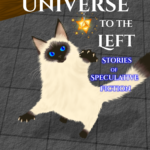Whenever I tell people I write, there’s always the inevitable question: “Oh? What do you write?” To which I answer, “Speculative fiction!” And, sometimes, that causes confusion. Especially if the person who asked is not a writer.
I say “spec fic,” as it’s also known, partly because I don’t really write based on genre. I don’t sit down and say, “I want to write a hard military sci fi today.” Instead I think “What if X, but Y? Wouldn’t that be neat.” Which means I do end up with the quandy of figuring out what genre(s) the story is once it’s finished, in order to sell it.
But, mostly, I say spec fic because that encompasses how I approach all of my stories: “What if X, but Y?” All stories work on this premise, of course (What if Great British Bake Off but for high schoolers? Also it was gay. Or, what if we knew where the crawfish sing?). But, for spec fic, the “What if…?” has to deviate from reality in some way. And those are just the kinds of stories I like to write, I guess!
So, this blog post will be an attempt to explain what actually makes up “speculative fiction” and how the genre taxonomy makes sense. There’s four major “clades” of spec fic, and they are…
Fantasy
This is the one people probably think of first when it comes to speculative fiction. This can range anywhere from Mistborn-esque secondary worlds with complex magic systems to the “Well, that just happened!” of Kafka’s Metamorphosis. Fantastical stuff is happening, and it’s important to the story.
What makes something fantasy is “magic,” which means what deviates from our reality doesn’t have a logical and/or scientific basis for it. You can manipulate the energies of the world with only intention and a gesture, or you do battle with a 20′ spider. You can build out your magic system as much as you like, but it still requires some fundamental force of the universe to be ignored or entirely re-invented in order for magic to function.
There are a ton of sub-genres to fantasy. They can describe the tech level of the world, the scope of the conflict, or the general vibe of the work. One of the sub-genres that I’ve been getting into lately is fantastique, which is French, as you can guess. Here’s what Wikipedia has to say about it!
What is distinctive about the fantastique is the intrusion of supernatural phenomena into an otherwise realist narrative. It evokes phenomena which are not only left unexplained but which are inexplicable from the reader’s point of view. In this respect, the fantastique is somewhere between fantasy, where the supernatural is accepted and entirely reasonable in the imaginary world of a non-realist narrative, and magic realism, where apparently supernatural phenomena are explained and accepted as normal. Instead, characters in a work of fantastique are, just like the readers, unwilling to accept the supernatural events that occur. This refusal may be mixed with doubt, disbelief, fear, or some combination of those reactions.
https://en.wikipedia.org/wiki/Fantastique
It’s this fun little flavor of weird, close to literary, sometimes overlapping with horror. Kafka’s story about the guy turning into a big ol’ bug is a good example. I don’t want to get into an argument about literary vs genre fiction here, since it is not a fun one to have, but I do want to point out that many people don’t consider fantastique or magical realism as “real” fantasy, and will stick it in the literary section of Barnes & Noble, who we all know is the true arbiter of what genre a book is. (and books can only ever be one genre, because they can only go in one section of the store!)
Science Fiction
This is the second most likely thing people will think of when you say “spec fic.” The deviations from reality in SF are based in real-world science. How much and how “hard” the scienced depends on the writer and the story. Some will do all the math to make FTL viable, while others will say that any form of FTL is scientifically impossible, so you are silly if you pretend otherwise.
How science and technology is used and extrapolated also depends on when the story was written and what was believed to be possible at the time. Look at The Island of Dr. Moreau and Frankenstein as examples. Or any Asimov story; the fact that it takes tens of thousands of years to make a pocket terminal the size of a cellphone is very, very, very funny.
Dystopias, utopias, and apocalypse/zombie stories fall under sci fi because they usually require some sort of tech that either does not currently exist (like engineering a zombie virus in a lab) or does exist but is not being used in that exact way yet (see: Jurassic Park). But I don’t recall any weird/fancy tech in 1984; then again, that book is now a “classic” and would go into the classic section of Barnes & Noble, so I guess that’s what genre it is!
Aside: “Science Fantasy”
These are stories that can technically go into both categories…but usually end up being called science fiction. Star Wars, for example, has magic, but it’s in space and there’s space ship battles, so, it’s a sci fi. Same deal with Dune; people do drugs to see the future, but it’s in space and the precognition is used to fly space ships. That’s just how it goes!
The one thing that I, personally, don’t understand is “psionics” being considered sci fi. Minority Report, or the Zero Escape games, for example. Telekinesis or seeing the future isn’t magic if it’s in our world and it’s from our brains being super, duper good, for some reason. There are people who believe these things are real, and that’s considered pseudo-science, so maybe it should be called pseudo-sci fi?
Horror
This is going to be “horror” in the literary genre sense, not movies. Here’s how it goes:
- If the scary thing is from something that could exist in the real world (like a serial killer or a saw trap) then it’s a “thriller.”
- If the scary thing is from something spooky (like a ghost or monster), then it’s “horror.”
Why is there this dichotomy? I don’t know! Any sort of taxonomy is inherently arbitrary. The Da Vinci Code is a “thriller,” but it’s not a scary story. So thrillers aren’t always scary, but they are supposed to get your heart pumping and your fingers turning that page.
When I say “spooky,” I mean “supernatural” or “paranormal.” Ghosts, demons, witches, aliens (the turning cows inside out kind, not the hanging out with them in space kind), haunted stuff. The kinds of things we all love on Halloween.
“Horror” as a literary genre is kind of weird, because it can be added to other things. Something like Dead Space would be a horror sci fi. Also there’s the question if the spooky stuff is ~actually real~ or if the main character is just ~crazy~ ooooo scary. Which is really not a cool thing to do! But that’s out of the scope of this post.
Alternate History
Now, this is a weird one. Wikipedia and diagrams include this in “spec fic,” so, I am, too, for this post.
Alt history is stuff like “What if the Nazis won ww2?” It takes a lot of world building and research to make these kinds of stories, a lot of “what if?”s, which is probably why it’s on this list. Even though it could have happened in reality, if things went slightly different.
There’s also fantasy stories that take place in an alt history, because magic is real. Like His Majesty’s Dragon. So, while they’re alt history, their fantasy-ness is what’s going to make most people think they’re spec fic.
Bonus: Furry Fiction
I don’t know if you’ve figured it out yet, dear reader, but I’m a furry. Furry fiction is kind of funny, because it’s all spec fic, in some way, but we (the furries) really don’t think of it as such. What if animals were all human sized and walked on two legs (even the snakes and sharks) and were intelligent and drove cars and stuff? There’s going to have to be a lot of speculative evolution or handwavium to explain all of this. And the world building can be deep, ever thought of how a chair or a suit of armor would need to be different if you had a tail?
It’s just an extra genre on top of everything else. A story like Zootopia would be “contemporary fiction”, since it’s about normal guys in a normal city doing having normal problems! Furry wizards fighting (non-furry) dragons would be fiction. Furries in space would be sci fi.
Some stories try to explain why furries exist. A sci fi story might say they’re “uplifted” animals or were genetically engineered; a fantasy story might have them as another sophont that exists, no different than a dwarf or elf. And most just…don’t. We just accept the world is this way and focus on what’s actually relevant for the story.
This is true of books that are furry and nature but don’t feature critters on two legs. In Watership Down, the rabbits are regular rabbits, but they have language and religion. They think and feel like humans do. Why? It doesn’t matter, and it’s never brought up.
Conclusion
I mentioned Barnes & Noble a few times here. I’m not picking on them, really, but it is a helpful illustration for what “genre” really is: a way for someone to know what shelf to stick your book on. Sites like Amazon allow you to get really granular (see: billionaire romances), but also to label your book with multiple genres, as there’s no shelves to worry about.
For things like short story markets, there’s usually a “vibe” that they’re aiming for instead of strictly genre. “Hopeful” fantasy, for example, or sci fi where the science is hard and central to the story. Anthologies tend to be even granular-er, looking for a matching vibe and theme. Queer body horror, Christmas slashers, familiars going on funky little adventures.
Some stories just defy categorization, and there’s nothing wrong with that. And some genres are really finnicky or have competing definitions (such as horror). Genre is for marketing, and that’s all it is! And if you wish to market yourself as an urban fantasy writer, or an SFF writer, or even an “idk whatever I feel like writing today” writer, you can do that, too! And that might change over time; a few decade ago, YA wasn’t even a thing. “Cli fi” is still a relatively new term, too. And you never know what genre you might fall in love with next!



